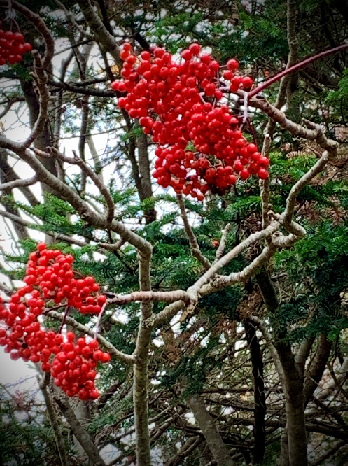Soil and Spirit: Frozen Yet Fruitful
By Jean Golicz, Master Gardener and member of the Board of Mercy by the Sea
Posted on
The bright red berries of Ilex verticillata are favored by birds once the ground freezes and there is a limited supply of worms and insects. More commonly known as winterberry, the fruit produced by this native shrub is more palatable when it has frozen a few times and softened. Although bitter and inedible for humans and pets, this plant is extremely important to birds who will choose its berries in late fall and early winter after consuming other more delectable treats.

Native to the United States, winterberry is a deciduous holly that is hardy in USDA zones 3 through 9. The shrub can grow to 12 feet wide and tall and has suckers that produce large thickets. Winterberry is dioecious, which means it requires both a male plant and female plant—grown within 50 feet of each other—to produce berries, but the berries appear on only the female plant. Both the male and female plants bloom in June and July with small, fragrant, white flowers that attract pollinating insects, such as bees and butterflies. Berries form on the female plant during summer and fall, turning red in late fall. More than 40 species of birds eat these berries.
As I watch the birds flock to the winterberries in my yard, I know they have waited until this day. The sky is gray and the ground frozen. Despite the bitterness of the fruit, it will sustain them throughout the winter months ahead. The past months have been bitter indeed. We have remained frozen, isolated, and distant. Plans are unclear like the gray winter skies. Yet the slow ripening fruit yielded by days of quiet reflection provides sustenance. I look again out the window and see such a variety of birds; Blue Jays, Cardinals, Sparrows. They are all so different yet unified by this bitter frozen fruit. Finding solace and sustenance in their shared pursuit...to survive, to see spring and to sing again!
Click here to view the University of Connecticut Plant Database.
